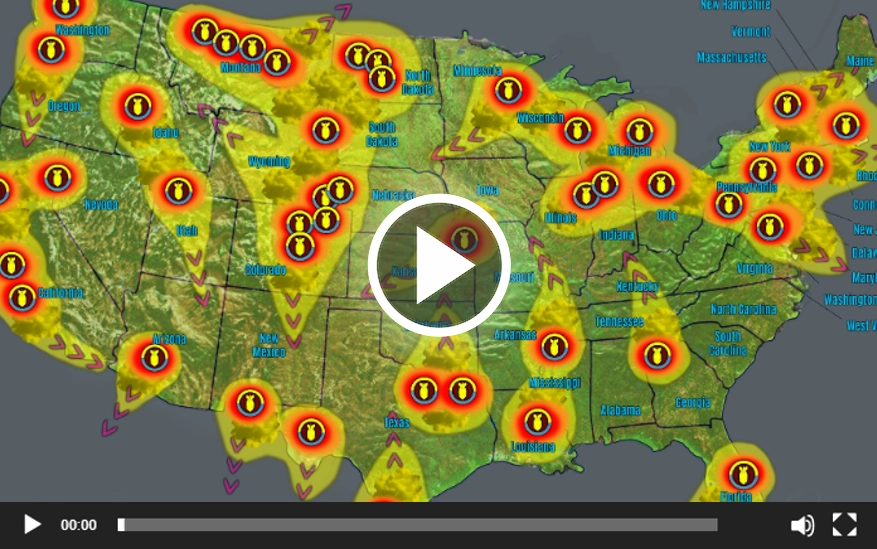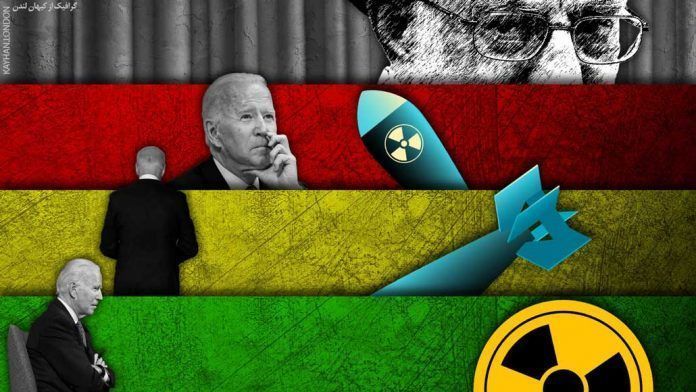The world is on the brink, teetering on the edge of a precipice. The Middle East, a region historically known for its volatility, is once again the epicenter of a looming showdown. And at the heart of this impending conflict? Two superpowers, the U.S. and Iran, locked in a deadly dance of power and influence.
The U.S., a global titan, has long been involved in the Middle East, and recent developments suggest that its involvement is about to intensify. But are we, the citizens of the world, truly prepared for the ramifications of such a confrontation? The stakes are apocalyptic, and the players are not mere pawns on a geopolitical chessboard.
Iran, often painted as the villain in Western narratives, is the backbone of many terror groups in the region. Without Iran’s financial and military support, groups like Hamas and Hezbollah would be shadows of their current selves. But why does Iran support these groups? The answer is simple: power and influence. By backing these organizations, Iran ensures it has a hand in shaping the region’s future.
On the flip side, the U.S. stands as the unwavering ally of Israel, providing it with both financial and military support. This alliance is not just based on shared democratic values but also on strategic interests. The U.S. sees Israel as a bulwark against Iranian influence in the region.
Must see! – Apocalyptic Showdown: How Tapping into Your Third Eye Can Illuminate the Path Ahead!

Recent intelligence reports, as highlighted by CNN, have sent shockwaves across the globe. Iranian-backed militia groups are allegedly planning to intensify their attacks on U.S. forces in the Middle East. These groups, emboldened by the ongoing conflict between Israel and Hamas, see an opportunity to strike a blow against the U.S., which they view as the primary obstacle to their ambitions.
The audacity of these groups is evident. In just one week, U.S. troops stationed in the Middle East faced a staggering 13 attacks. These assaults, a mix of drone strikes and rocket attacks, have targeted U.S. forces in both Iraq and Syria. The Pentagon, the nerve center of the U.S. military, has been unequivocal in its assessment: these attacks bear the unmistakable mark of Iran.
While some may argue about the direct involvement of Iranian leadership in these attacks, such debates are mere distractions. The undeniable truth is that these militia groups are the offspring of Iran. They thrive on Iranian funds and weapons. Their actions, whether sanctioned directly by Iranian leaders or not, reflect the will and intentions of their benefactors in Tehran.
Must Read: NESARA’s October Surprise! Biden’s Impeachment Trial Might Finally Unleash the MEDBEDS Revolution!
The financial markets, often the canary in the coal mine, are also showing signs of distress. The recent fluctuations in the yield curve between the two-year and the 10-year treasury note suggest that investors are nervous. Is this the calm before the storm?
U.S. Secretary of State Antony Blinken recently made a bold declaration, ensuring that the U.S. would act “swiftly and decisively” against any assault from Iranian proxy groups. But what lies beneath these words? Is this just political posturing, or is there a deeper game at play?
Blinken’s warning to Iran was crystal clear: the United States would not hesitate to retaliate against any aggression by its proxies. This comes amidst the escalating tensions between Israel and Hamas. But here’s the catch: Iranian-backed terror groups have already struck our forces not once, not twice, but a staggering 13 times. So, the question that begs to be asked is, why hasn’t the U.S. acted yet? What’s holding them back?
Important! – The Khazarian Mafia’s Grip: Control Codes Shaping the U.S.-Israel Relationship.

The Biden administration’s reluctance to confront the Iranians and their sponsored terror groups is glaring. Some might argue that they’re treading cautiously to avoid igniting the apocalyptic phase of World War III. And let’s be real, such a catastrophic event wouldn’t exactly be a feather in Joe Biden’s cap for his 2024 re-election campaign.
But there’s more to this story. As the Middle East teeters on the brink of full-blown war, a staggering number of U.S. citizens find themselves in potential danger zones. Recent estimates from the State Department suggest that around 600,000 U.S. citizens were in Israel, with another 86,000 in Lebanon when Hamas launched its attacks. The sheer logistics of evacuating such a vast number of people is a nightmare scenario for any administration. Yet, one can’t help but wonder, why are so many Americans still in the Middle East, given the palpable tension?
And while we’re on the subject of unexpected alliances, French President Emmanuel Macron’s recent proposition to form an “international coalition” against Hamas is nothing short of astonishing. Macron’s call to arms suggests that nations battling ISIS should also turn their attention to Hamas. But let’s not kid ourselves. The likelihood of Europe jumping into the fray is slim. The old continent has its own set of problems and would probably prefer to watch from the sidelines. Thus, it seems the U.S. and Israel might be left to face the Iranians and their proxies alone. And let’s not sugarcoat it; the ensuing conflict will be nothing short of brutal.
Breaking! – U.S. Citizens in Danger: The Secret Crisis Unfolding Right Now!

But wait, there’s another twist in this tale. In a shocking revelation, post the overturning of Roe v. Wade, the number of legal abortions in the U.S. didn’t decrease. In fact, it rose by a marginal 0.2 percent. This unexpected turn of events underscores the fact that our nation missed a golden opportunity to change its course. As we stand on the precipice of what could be World War III, one can’t help but question whether our actions will find favor.
And as if the Iranian threat wasn’t enough, the U.S. also has the looming shadows of China and Russia to contend with. The Biden administration’s hesitancy to confront the Iranians and their proxies is understandable. But the reality is, they won’t stop targeting our troops. The U.S. is at a crossroads: either pull all forces out of Iraq and Syria or take the fight to the enemy.
In conclusion, the Middle East crisis is more than just a geopolitical skirmish. It’s a complex web of power plays, hidden agendas, and potential global ramifications.
As the world watches, one can only hope that the decisions made will be in the best interest of global peace and stability. But for now, the drums of war are beating, and the world waits with bated breath.




